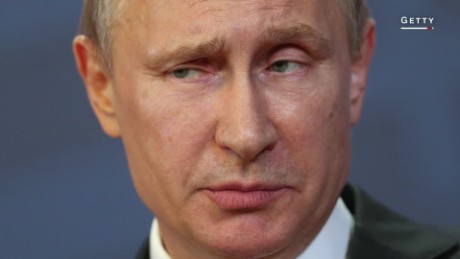Story highlights
- Putin says Russia wants friends, not enemies, in the world
- He says Russia wants to cooperate in fighting international terrorism
Moscow (CNN)Russian President Vladimir Putin said his country is ready to cooperate with the new US administration, as he gave his annual state-of-the-nation address Thursday in Moscow.
His comments come at a time when US-Russian relations have sunk to their lowest point since the Cold War, amid tensions over Syria, Russia's actions in Ukraine and allegations of Russian meddling in the US presidential election.
US President-elect Donald Trump has, however, praised Putin as a firm leader and the pair have indicated they want ties to improve.
"We are prepared to cooperate with the new American administration," said Putin in his address, although he did not mention Trump by name.
"It's important to normalize and begin to develop bilateral relations on an equal and mutually beneficial basis," he said.
"Mutual efforts by Russia and the United States in solving global and regional problems are in the interest of the entire world."
Putin also said he hoped to join the United States to fight the threat of international terrorism.
This, he said, is exactly what Russia's military is doing in Syria, as it backs the forces of President Bashar al-Assad against opposition fighters.
"We have a common responsibility to ensure international security and stability and strengthening non-proliferation (of nuclear weapons)," he said. "I would like to underscore that attempts to destroy this strategic priority are highly dangerous and could lead to world catastrophe. We cannot forget about that for one second."
Putin: Russia doesn't want confrontation
In a speech notably devoid of fireworks compared with his previous two state-of-the-nation addresses, the Russian President also said his country was ready to help solve international problems.
"We don't want confrontations with anybody -- we don't see it as necessary," he said. "Unlike our foreign colleagues, we don't look for enemies, we need friends."
But, Putin said, "we will not allow infringements on our interests." Russia will continue to build its future without others telling it what to do, he said.
"Justice, fairness and respect in international affairs -- this is what the trend should be in the 21st century, but sadly these developments in international relationships after the Cold War were wasted," he said.
"We should focus on new tendency of international development even if we have issues in our relationship with some countries, like the United States, which is a bit cold at the moment."
Putin said he was confident that positive dialogue was possible with the European Union.
At the same time, he spoke of Russia's pivot to the east, citing the importance of its relationships with China, India and Japan.
Putin's more measured tone this year may reflect recent polling that indicates a clear majority of Russians want an improvement in relations with the West.
He may also see the arrival of Trump in the White House as a chance to position Russia and the United States as equals on the world stage.
Internal focus
For the first hour of his speech, Putin focused heavily on domestic economic issues, as he praised the Russian people for staying united in the face of "difficult conditions."
Thanks to a program of state help, he said, agriculture is now "a successful industry that feeds the country and goes to international markets."
Putin said the international sanctions imposed after Russia's annexation of Crimea from Ukraine in 2014 had helped its internal markets grow. He added that the export of agricultural products now contributed more to Russia's economy than the arms trade.
The Russian leader also talked about the need for increased investment in health care, education, technology and science and said it was important that Russia boost its position in the global economy.
Russia needs to strengthen its defense from cyber attacks, he said, "because that is the basis of our future defense and the security of our country."
Over the summer, US intelligence officials accused Russia of meddling in the US presidential election by hacking the Democratic National Committee and releasing emails of Clinton campaign officials.
Trump's relationship with Putin was heavily scrutinized during the campaign.
On Wednesday, Putin told a foreign policy conference in Moscow that he had recently spoken by phone with Trump and that their "opinions coincided" that the relationship between the two nations had to be "straightened out."











